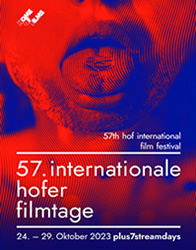Attendance and other records
In 1977, the festival didn’t end on Sunday afternoon, but rather went on into the evening. And that was a necessity, due to great public demand. The festival’s organisers were pleased to announce an increase in public interest – yet again. Self-confidently, Badewitz declared that Hof no longer needed to make its claim with big names.
“We want to discover the new Herzogs.”
One of the most exciting events was Wolfgang Petersen’s gay film DIE KONSEQUENZ (“The consequence”). John Cassavetes’s films made up the fascinating retrospective and zombie-specialist George A. Romero provided for thrilling film nights with his bloodthirsty spectacles.
In 1978, according to the Munich-based Süddeutsche Zeitung, “Hof was bursting at the seams”. The local hotels were booked out and at the festival opening Badewitz paid thanks for “fantastic audience numbers”. Doris Dörrie, who had been working for the festival since 1975 as an announcer, interpreter and in guest assistance, was present among the newcomers with DER ERSTE WALZER (“The first waltz”) – seven years later she created the German romantic comedy with her hit film MÄNNER (MEN…). The real sensation however came from the Upper Palatinate; it was there that Josef Rödl, together with laymen from his hometown, staged the tragedy of a person incapable of defending himself in ALBERT – WARUM? (ALBERT – WHY?). John Carpenter celebrated his German debut with DARK STAR and ASSAULT ON PRECINCT 13, and David Lynch, who would go on to become even more famous, presented his experimental horror cult movie ERASERHEAD.
Now, the Hof Film Festival was well-established, “in Germany, right up at the top”, as the Zurich-based Weltwoche wrote, and was expanding yet again: as of 1979, the festival started on Wednesday evening. That meant more time for repeat screenings and more slots for additional films, whose directors, producers and distributors were pushing to have their start in Hof.
It looked as if nothing could go wrong. Even when the German films, for which the festival served as a major platform, had little to offer. But still, films by Werner Schroeter, Rosa von Praunheim and Herbert Achternbusch worked up audiences in 1979, and the Süddeutsche Zeitung praised the “magician’s box of surprises for cinema freaks” and claimed that, while the stream of visitors at larger festivals was dwindling, Hof had “way too many films and way too many viewers.”
By this point, the festival had access to some DM 100,000, but it still remained a low-budget festival. And in 1981, the maestro of low-budget cinema was celebrated with an extensive retrospective: Roger Corman presented nine of his films in person. 1982 saw the German premiere of two Wim Wenders films – DER STAND DER DINGE (THE STATE OF THINGS) and HAMMETT –, Achternbusch was represented twice with DER DEPP (“The twit”) and DAS GESPENST (THE GHOST), Dominik Graf made his debut with DAS ZWEITE GESICHT (“Second sight”), Neil Jordan visited from Ireland, and Jim Jarmusch brought along his 30-minute version of STRANGER THAN PARADISE from the USA. It was in Hof that Jarmusch found a backer to help him develop it into his first feature-length film, which was screened two years later, in 1984. That year also saw Neil Jordan travelling to Hof again (with THE COMPANY OF WOLVES), as well as Wim Wenders (with PARIS, TEXAS), and among the younger German directors, Oliver Herbrich strove to distinguish himself as “the new Herzog” with WODZECK.
The quieter films dominated, but there was also one horribly loud one: A NIGHTMARE ON ELM STREET, Wes Craven’s starting signal for the Freddie Krueger series, had its world premiere in Hof. The Frankfurt daily FAZ quipped,
“Horror in Hof”.


